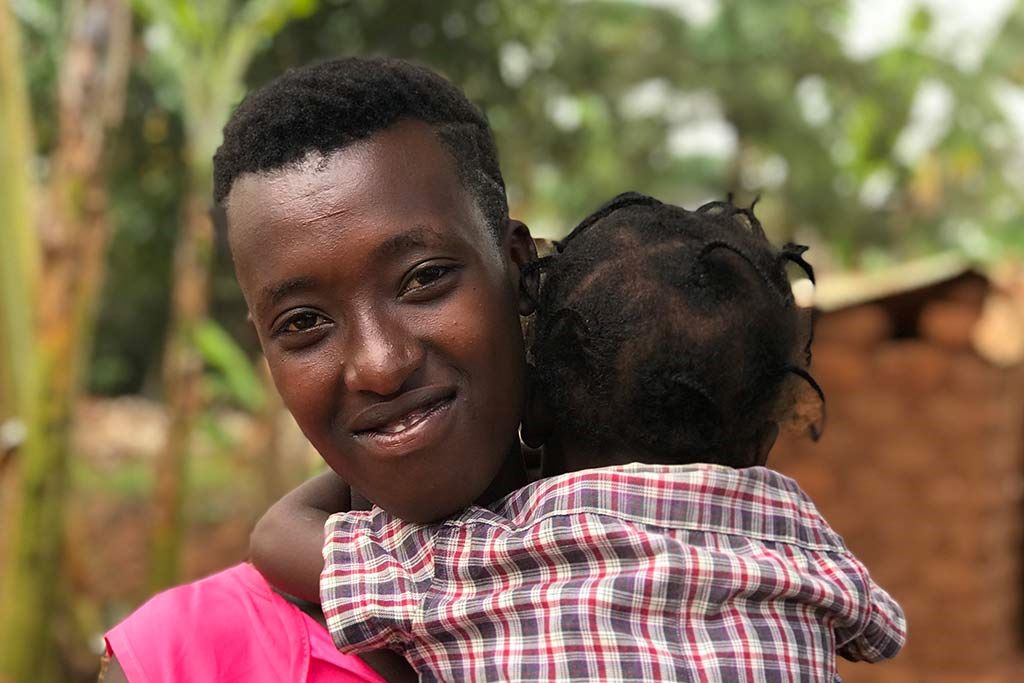
This teenaged mother is determined to go back to school as soon as they open. She has received education and support from one of Kvinna till Kvinna’s partner organizations, Réseau des Femmes Oeuvrant pour le Développement Rural. Photo: Kvinna till Kvinna
In Rwanda, as in many cultures throughout the world, teenaged mothers are terribly marginalized. Especially in rural areas of the country, many girls are without access to proper birth control or reproductive education. Many are victims of gender-based violence, and yet, of course, they are blamed for their pregnancy.
“Once you’re a teen mother here, you’re basically garbage. It’s your fault, your stigma, your shame. Your parents disown you. If you are a victim of rape, you don’t admit it because you don’t expect people to believe you,” said my daughter Bridget Rhinehart, the Rwandan country director for the Swedish nongovernmental organization Kvinna till Kvinna (Women for Women).
Kvinna till Kvinna funds grassroots women-run organizations in Rwanda that align with its feminist values of responding to gender-based violence, promoting reproductive health and enhancing the role of women as decision-makers and leaders. It is often one of several funders, including other NGOs and even governments, as these organizations cobble together money sources to do their work.
Among the Kvinna till Kvinna partner organizations is Empower Rwanda, which is working in the northern part of the country to support teen mothers and other vulnerable girls. Rather than fight the education, economic empowerment and legal rights battles on behalf of these young women, Empower Rwanda works with them so that they will gain the confidence and skills to fight for their rights themselves, Bridget said.
She gives this recent example. Many of the teen mothers wanted to go back to school but were precluded in a practical sense from doing so. Disowned, they couldn’t turn to their family for child care, nor could they afford the school fees. Under Rwandan law, all children are entitled to an education. With that growing sense of self-esteem, some of the teens pleaded their case before the district council, using their new voice to explain their situation. They asked for and ultimately received a government subsidy so they could attend school. A true success.
Bridget tells this story with very much a glow in her eyes. It’s a concrete, positive outcome that bettered the lives of females in Rwanda. Another partner organization, Duhozanye, worked with women farmers in the southern part of the country. These small-holder farmers have a legal right under the law as much as men do to obtain fertilizer for their crops, yet were being marginalized. Duhozanye staff gave women the skills to confront government officials about this inequity and to secure the funding – which, I might add, the government was supposed to do all along. Just recently, Kvinna till Kvinna began a relationship with an organization run by and for deaf women and girls, providing overhead costs so the group could concentrate on its work without wondering how to pay the rent.
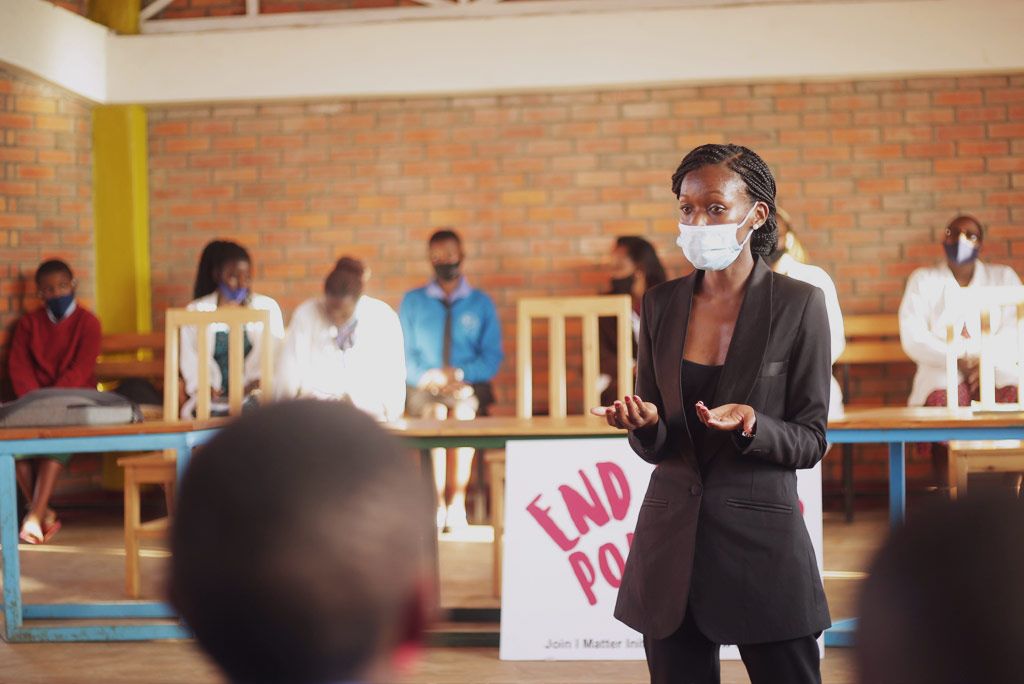
Divine Ingabire, executive director of I Matter Initiative, another Kvinna till Kvinna partner organization, speaks to school girls about the importance of feminine hygiene. I Matter also donated packages of pads, soaps and underwear to the students. Photo credit: I Matter Initiative
I tell you this not to get a pat on the back for Bridget (although one wouldn’t be misplaced!), but to show you the remarkable work being done in this very small African country to better the lives of women and girls. The dozen or so organizations funded by Kvinna till Kvinna are just the tip of the iceberg, really. Countrywide, there are many more, large and small, Christian and secular, often started by one or two women who saw a need and worked to find a solution.
Yet there remains much need, despite significant gains.
Since the country has worked to rebuild itself following the genocide in 1994, many laws have been passed with the goal of giving women agency over their own bodies, intellects and political status. The story of Rwandan women is in many ways a good news story. The Rwandan constitution mandates that at least 30 percent of all elective positions must be held by women. In today’s Rwandan Parliament, 61.3 percent of those in the Chamber of Deputies (like the US House) and 38.5 percent of those in the Senate are women. Every time I contemplate this, I find it remarkable. Build parity into the constitution. What a concept!
Among the laws passed by Parliament over the years: equal inheritance rights; equal rights to land access and ownership; protection against gender-based violence in the workplace; emphasis on gender equality in the government budgeting process; guaranteed maternity leave benefits; criminalization of gender-based violence, child violence, human trafficking, marital rape and forced marriages.
While this all sounds tremendous and forward-thinking and even visionary, and on one level it absolutely is, there is always, is there not, the practical application of these laws in everyday life. If women farmers were being treated with the equity required by law, would they really have to defend that right? Would girls have to demand equal education under the law even though that’s guaranteed? And if you live in a rural village, you may have the right to land ownership, or to file charges against your abuser, but if you don’t know these laws even exist, how are you to access the system?
In a 2018 United Nations Women report on Rwandan women serving in Parliament, representatives said while they are proud to be there, they live in a culture and society that doesn’t always value their voice and their leadership. They report that some of their male colleagues believe they got elected just to find a man, some question their capabilities, husbands say they don’t spend enough time at home. And when they are at home, they are expected to perform all of the traditional wifely and mother duties.
While many women in many nations may still experience some or even all of these circumstances, at least in certain cultures I feel like women are increasingly willing to defend their worth. I get the sense that’s not necessarily always so in Rwanda.
Again, as with most nations, economic parity is elusive. The average monthly salary of a Rwandan is $225, considerably less for sole proprietors, according to international marketing firm BDEX. And on average women make 22 percent less than men. Yet they are often the primary breadwinner. Women hustle in Rwanda. They do a smattering of this, a bit of that, they have side businesses in addition to their jobs, or they run the little bodega or have a stall in the fabric market.
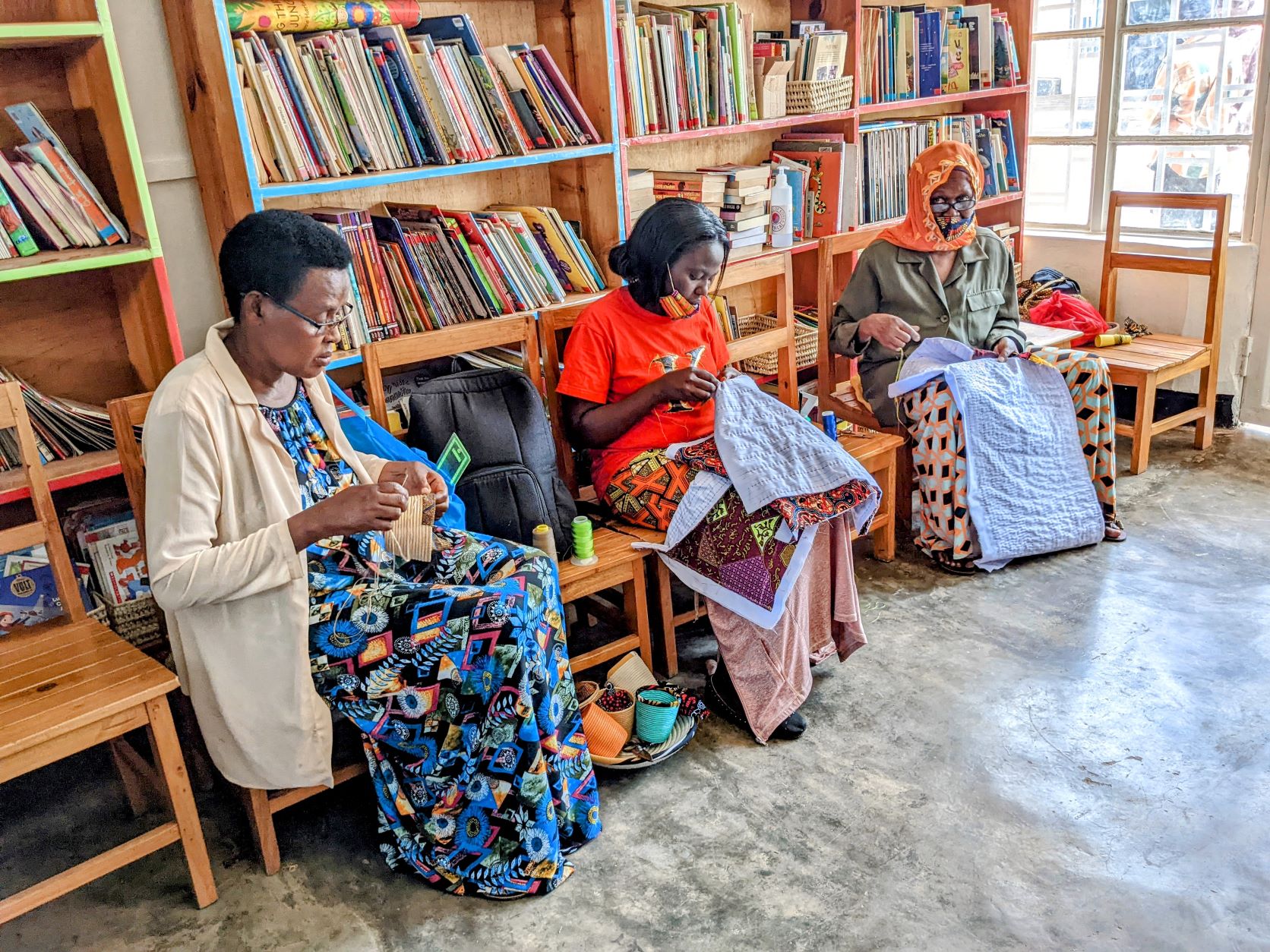
And some help their neighbors to find long-term financial stability, which in turn improves their lives in so many other ways. One such group of women founded the Nyamirambo Women’s Center in Kigali 15 years ago. The center, located in Nyamirambo, one of the oldest neighborhoods in Kigali, is probably one of the coolest places I’ve ever visited. Here, women help women to learn a trade, to become literate, to learn their rights, to train in basic computer skills, and on. In 2013, the women launched a product line, Umutima, which means ‘heart’ in Kinyarwanda. Today, it employs 58 seamstresses, who make amazing clothing, housewares, baskets, children’s toys –all with Rwandan fabric. They earn a salary that allows them to better their lives and that of their families, and they earn self-respect and agency. Not long ago, they expanded that entrepreneurial spirit to include Nyamirambo walking tours, traditional cooking workshops and basket-making workshops for the likes of me, a visitor. Three years ago, they opened a small community library, mostly for children, with books in Kinyrwanda, French (the official language until the early 2000s) and English. The neighborhood women, then, become literate, learn to read English, even, and then pass on that literacy to their children.
On the center’s website, there is a short video featuring center president Aimee M Umujeni. She says, “I think there is a lot of change. Now we have a right to start a business, to work and earn money and decide what to do with our own income. That is something we didn’t have years ago.
“These days, a woman, she wants to contribute to the family, she wants to become independent, she wants to buy something that she wants without waiting for a husband. Let’s say many years ago, women were thinking, ‘This is where I have to be. I can’t go out.’ But now I see a (government) minister who is a wife, she is making a decision. Even out there in the village, I can feel proud, I can even do this. If you have women doing well and managing work well, it helps everyone to have that self-confidence.”
Really wonderful stuff.
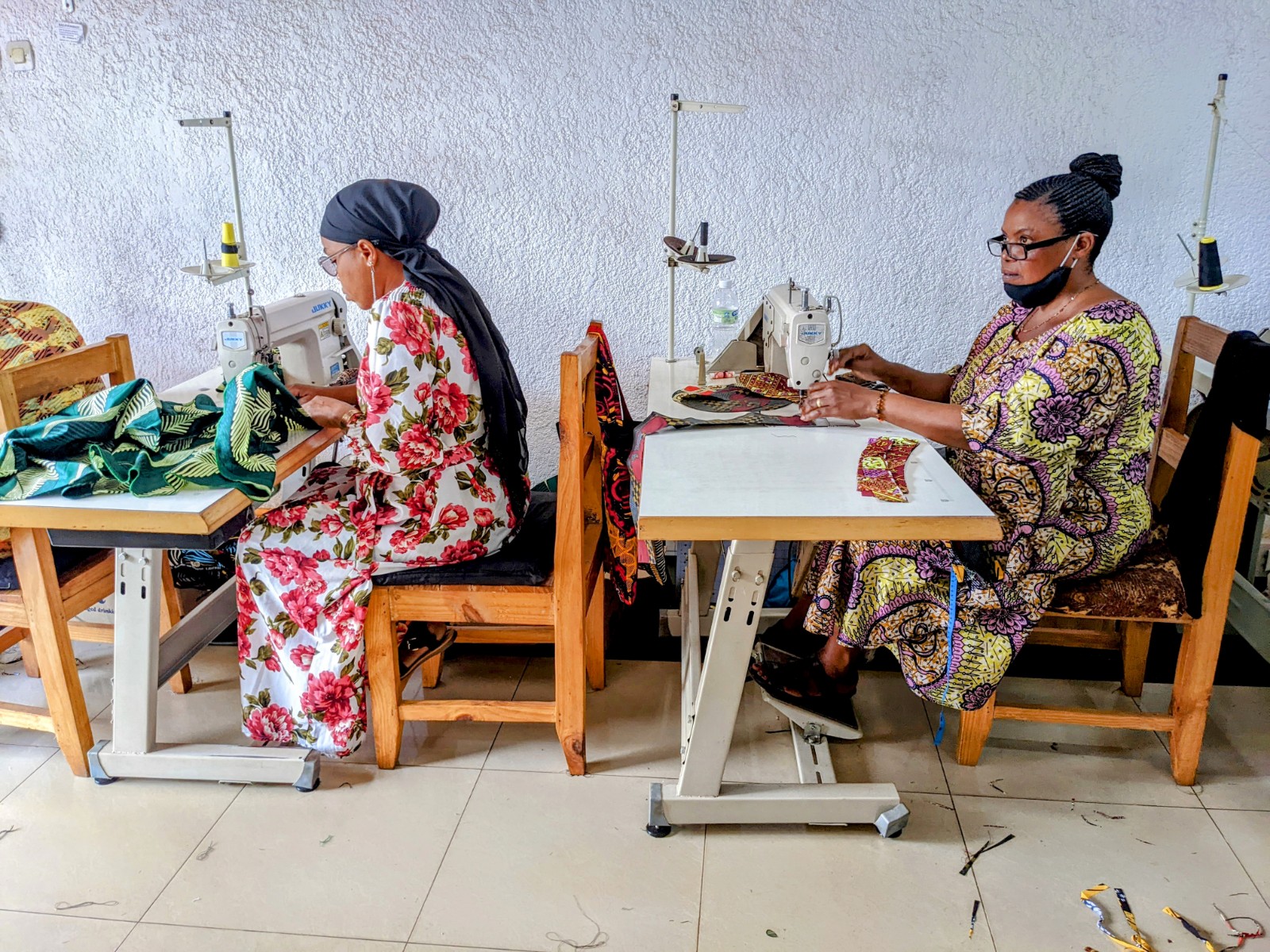
My daughter is certainly inspired, every day. Bridget, as her mother before her, is a strong and proud feminist. By this, we mean that every woman has a right to realize her full potential, and we support the work necessary to allow that flowering to happen. It is as simple and as complicated as that. It is not always easy – has never been always easy – to proclaim oneself a feminist. It comes, unfortunately, with patriarchal garbage about overstepping bounds. And so imagine proudly embracing that moniker as a Rwandan woman in a largely patriarchal culture. Difficult – but oh so freeing, too.
“I feel there needs to be more people in the world who are proud to say, ‘I’m a feminist,’” said Bridget. “We talk about this a lot with our partners because they face this backlash from a lot of people. ‘You’re just saying your feminist to get money from those white women.’ And they’re like, no, this is what I believe. We are funding Rwandan feminist work. And it’s so rewarding. “
How wonderful that Bridget has found a vocation that allows her to be in the thick of this work, in a small African country populated by so many women inspired to find their own voices.
“I’m very privileged to be part of the amazing work these women are doing – these leaders, these visionaries – and to witness them overcome so many troubles,” she said. “I’m proud to be part of their journey, even in a small way. I work with women, I support women, it’s the best.”
So while Rwandan women may have a ways to go to reach parity in their country, I am reminded anew, as if I ever needed reminding, that women are remarkable, resilient beings. For the country’s women come so far, with so little, and eke out their own path should be an inspiration to all of us.
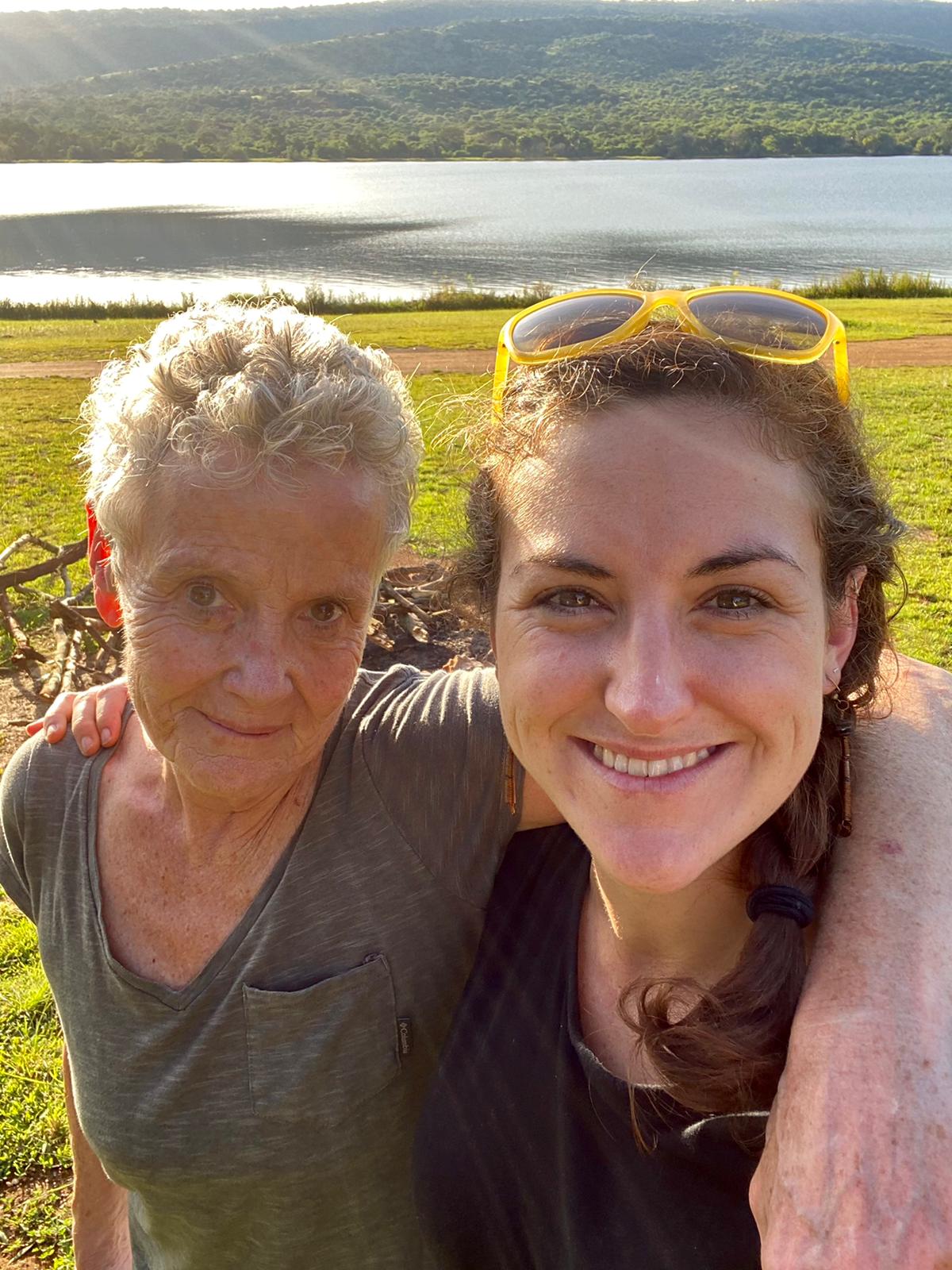

Reader Comments
❤️❤️❤️. So interesting. Love the last caption.
Strong words, strong women. Thank you for this view into a world we know so little about.
Great opportunity to let your voice be heard, Deborah….and huge kudos to Bridget for genuinely, ardently being that voice in her wonderful work!!
Love learning about this….have you heard about our new leadership team at South Church? Two women working collaboratively. Rev Ellen Quaadras and Kirsten Hunter, DLM! Ellen begins in August. South Church has been working toward collaborative governance for 3 years and we’re excited to really dive in when we have a settled minister in place along with the DLM. You’d enjoy being here for this Deborah!